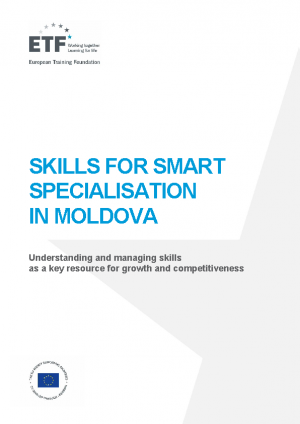Skills for smart specialisation in Moldova: Understanding and managing skills as a key resource for growth and competitiveness
Read the Summary Note
This report presents findings from an assessment of the implication of skills in Moldova’s smart specialisation strategy. The ETF’s role is to support Moldova as it endeavours to give vocational education and training systems a clear role in the implementation of its smart specialisation strategy. The report explores skills data at sub-sectoral level in the context of an evolving labour market, in order to improve competitivity and foster innovation. Two priority areas are covered: renewable energy development and food processing. The impact of skills in both areas was studied using data from quantitative and qualitative research. From the results, it is possible to claim that smart specialisation in the energy sector requires investment in high-skilled workers, while low- and middle-skilled workers make up the food processing sector. Indeed, investment in human capital development has a long-term impact on citizens’ and the economy’s well-being.
The results also reveal that despite relevant education and training programmes in the field of food processing and energy, skills imbalances persist. The skills mismatches can be characterised by skills shortages and skills gaps. Both hamper growth and innovation at the micro- and macro-levels. Neither individual companies nor the broader economy can withstand growth and innovation if the labour force is not equipped with the requisite skills that enable increased productivity and the capacity to adapt to market demand. Skills also have an important role in enabling workers to seize the best available opportunities. The types and levels of skills companies require changes with consumer preferences, increased international trade and technological change. Resolving the skills mismatch will allow Moldova’s economy to face the future with confidence.
The report concludes with nine recommendations:
- Position vocational education in the skills ecosystems for innovation and regional development
- Overcome skills shortages and skills gaps in renewable energy – with focus on biomass
- Overcome skills shortages and skills gaps in food processing
- Provide support to SME skills development in renewable energy
- Provide support to SME skills development in food processing
- Encourage and enable employer engagement
- Support the role of continuing vocational education
- Address limitations in human capital data and statistics
- Promote replication of similar analyses in other priority areas
Did you like this publication? If you would like to be notified when new content like this is published, subscribe to receive our email alerts.
